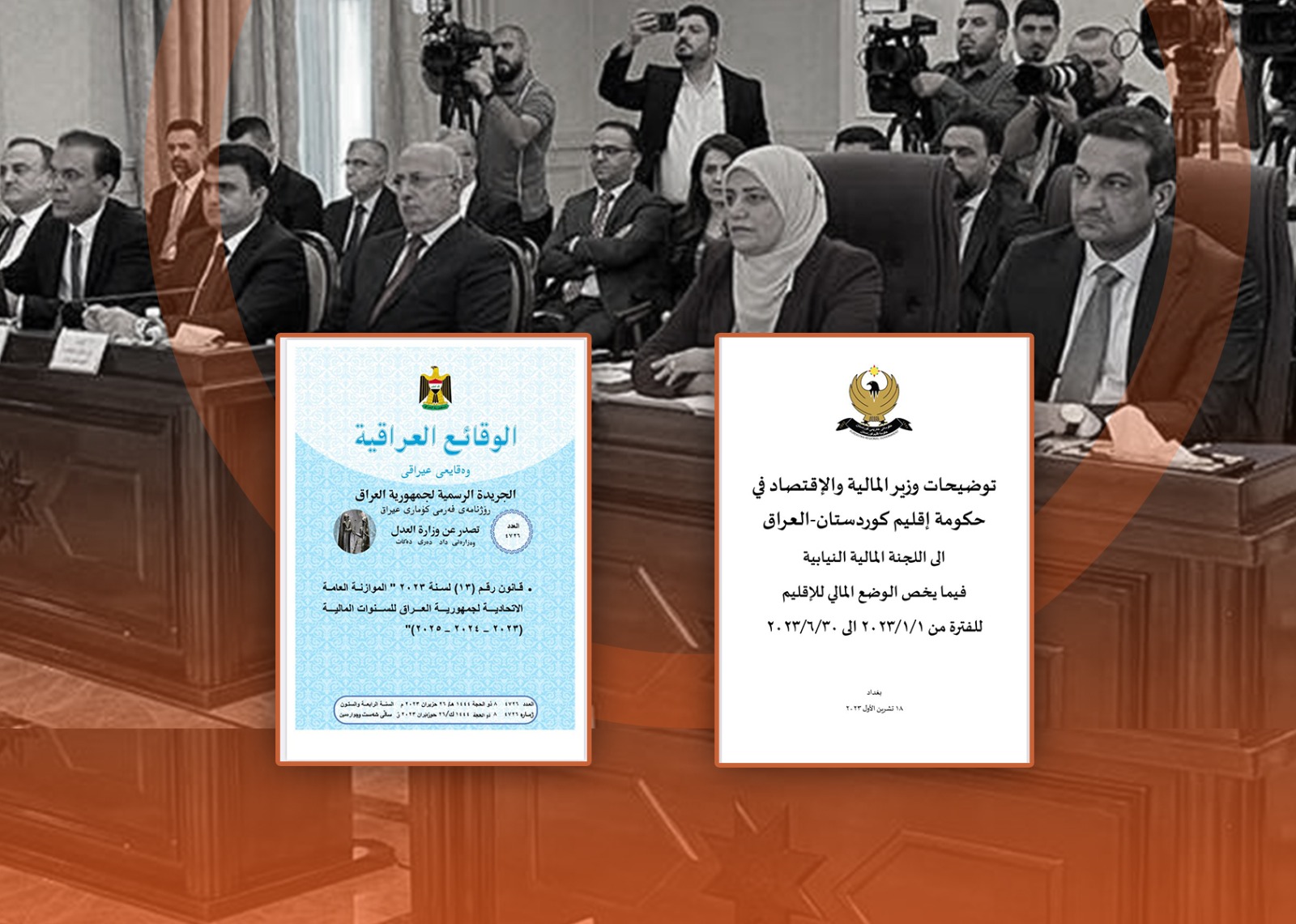An Analysis of Disparities in Revenues and Expenditures of the Kurdistan Region between Erbil and Baghdad
25-10-2023
Overview
While negotiations between the Erbil and Baghdad delegations persist, substantial practical and long-term results remain elusive. On October 18, 2023, the Ministry of Finance presented a comprehensive 30-page report to the Finance Committee of the Iraqi Parliament. The report delves into the intricacies of expenditures during the first half of 2023 and the financial requirements of the Kurdistan Region. It provides detailed accounts, including the number of employees, contract employees, and civilian and military pensions. According to the report, the monthly expenditure on various forms of salaries totals 913 billion dinars, amounting to over 10.963 trillion dinars annually. However, the 2023 budget allocation from Baghdad stands at only 10.457 trillion dinars. This discrepancy surpasses 500 billion dinars. Even if Baghdad were to dispatch salaries separately or manage the distribution independently, the fiscal gap persists.
Another pivotal aspect of these negotiations pertains to the complex issue of oil compensation, how to remunerate companies for each barrel of oil produced. In the 2023 budget, the Kurdistan Region has committed to delivering 400,000 barrels of oil daily to SOMO. However, the method of covering the production and transportation costs remains ambiguous.
Currently, Baghdad proposes a rate of $6.9, whereas the Kurdistan Region advocates for $32.9. Intriguingly, Deloitte's report for the first quarter of this year reveals that the cost of oil production in the Kurdistan Region stands at $34 per barrel. This variance underscores Baghdad's deviation from the previously agreed-upon price, with proposals ranging from the Iraqi Ministry of Planning's $19 this year to the $27 per barrel outlined in the 2021 Erbil-Baghdad agreement and also as per the Iraqi 2023 budget, it is set at $19 per a barrel. The negotiations now seem to orbit around the uncertain figure of $6.9 and the specific source of this information remains unknown!
The current method of domestic oil sales poses a significant financial risk to the Kurdistan Region. As reported by the Ministry of Finance, the Kurdistan Regional Government (KRG) managed to sell over 10 million barrels of oil during the first half of this year and the revenue was 309 billion dinars. However, after deducting the associated expenses, the net revenue for Kurdistan amounted to only 30,387 dinars per barrel. Prolonging the delay in reaching an agreement will impose a burden on both Erbil and Baghdad, with Baghdad in particular facing the challenge of having to provide monthly salaries to employees in the Kurdistan Region, rather than benefiting from oil-related revenues.
Furthermore, although the Kurdistan Region openly discloses revenue from domestic oil sales, there is a noticeable lack of transparency regarding domestic crude oil sales within Iraq. Regrettably, the publications from the Ministry of Oil and Ministry of Finance do not provide data on domestic oil sales. While SOMO and the Oil Ministry regularly release information on daily export volumes and monthly export revenues, this data does not encompass details on domestic oil consumption and the income generated from internal oil sales.
As an illustration, during the month of August, Iraq achieved a daily oil production rate of 4.71 million barrels. However, the volume of daily oil exports amounted to 3.43 million barrels, establishing a notable discrepancy of 1.28 million barrels daily. The income generated from this surplus remains undisclosed.
Should this particular revenue be included in the Ministry of Finance's report and integrated into the monthly figures for oil and natural resources income, the gap between the revenue stemming from Iraqi oil exports and the reported production data from both the Ministry of Oil and Finance would substantially widen. It is worth noting that the comprehensive cost per barrel of oil in Iraq, inclusive of investment expenditures, utility disbursements, and the fiscal obligations assumed by the Ministry of Oil, remains a matter yet to be revealed.
Of notable significance is the comprehensive cost per barrel of oil in Iraq, encompassing investment expenses, disbursements to companies, and the financial obligations overseen by the Ministry of Oil. Regrettably, this data has not been publicly disclosed as of now.
Drawing upon data from the KRI Ministry of Finance, Deloitte, and Iraq's 2023 budget, we present our analysis of the figures, highlighting the disparities between Erbil and Baghdad in domestic revenue, the cost per barrel of oil, and the number of employees and their salaries.
What are the Kurdistan Region's Monthly Financial Revenues and Expenditures?
According to the Ministry of Finance's report, which was presented by the Kurdistan Regional Government to the Finance Committee of the Iraqi Parliament on October 18, 2023, the total revenue during the first half of 2023 amounted to 5 trillion, 320 billion, 500 million, 23 thousand, and 738 dinars. Out of this, only 1 trillion, 146 million, 571 thousand, and 450 dinars were allocated to wages for oil production and transportation companies. Consequently, 3 trillion, 720 billion, 353 million, 452 thousand, and 288 dinars represented the Kurdistan Region's total revenue over six months, encompassing both oil and non-oil sources. This translates to an average monthly revenue of 620 billion, 58 million, 908 thousand, and 714 dinars for the Kurdistan Region.
Between January 1, 2023, and June 30, 2023, Baghdad disbursed a total of 2 trillion dinars to the Kurdistan Region in the form of budget allocations and loans. However, according to the report, only 1.6 billion was provided as loans, and 400 billion was allocated as part of the budget.
However, during the first six months of 2023, the combined total revenue and the financial support received from Baghdad amounted to 5 trillion 720 billion 353 million 452 thousand 288 dinars. This translates to a monthly sum of 953 billion 392 million 242 thousand 48 dinars when considering both domestic revenue and funds from Baghdad.
The recent report reveals that the Kurdistan Region's exclusive monthly salary expenditure totals 913 billion 623 million 64 thousand dinars, resulting in a cumulative expense of 5 trillion 481 billion 738 million 384 thousand dinars for six months. Additionally, the expenditure related to private sector electricity generation in the Kurdistan Region amounted to 575 billion 579 million 487 thousand dinars. Meanwhile, the collective operating expenditure, reached 646 billion 997 million 285 thousand 788 dinars, and the investment expenses tallied 271 billion 969 million 723 thousand dinars.
During the six-month period, the total expenditures of KRI amounted to 6 trillion 976 billion 284 million 879 thousand 788 dinars. The average monthly expenditure stood at 1 trillion 162 billion 714 million 146 thousand 631 dinars. Consequently, the monthly deficit, on average, was 209 billion 321 million 904 thousand 583 dinars. As a result, the report highlights that the expenses of electricity generation companies have not been settled.
What is the average salary of a public employee in the Kurdistan Region compared to Iraq?
According to the 2023 Iraqi budget, there are a total of 4,074,697 employees in Iraq. The allocated budget for these employees is an impressive 59,365,778,837,000 dinars annually, which translates to approximately 14,569,372 dinars per year for each employee and an average monthly salary of 1,214,114 dinars.
It's important to note that these employees are categorized into twelve different grades, and the highest annual salaries are found in the security sector, which receives more than 25 trillion dinars annually. Within the security sector, the Interior Ministry leads in terms of salary, followed by the Defense Ministry and Hashd al-Shaabi.
In the 2023 budget, it is revealed that the Hashd al-Shaabi forces, established in 2014, consist of 238,075 individuals. Notably, the budget allocates 3 trillion 468 billion dinars exclusively for their salaries, resulting in an annual payment of approximately 14,570,000 dinars for each Hashd al-Shaabi soldier, which amounts to over 1,214,000 dinars per month.
Based on the Kurdistan Regional Government (KRI) Ministry of Finance's report, the Kurdistan Region employs a total of 682,141 individuals, with a combined monthly budget of 734,593,244,000 dinars, resulting in an average of 1,076,893 dinars per employee. Comparatively, the average monthly income disparity between an employee in Iraq and the Kurdistan Region is 137,000 dinars. Contract employees in the Kurdistan Region earn an average of 460,000 dinars, while non-contracted teachers receive varying incomes, ranging from 200,000 to 400,000 dinars, totaling 36,542 teachers.
Additionally, there's a notable disparity in the employee count between the Kurdistan Region, specifically Erbil, and Baghdad. As per 2023 budget, Erbil has 658,189 employees, while the Ministry of Finance's data indicates 682,141 employees, creating a variance of 23,897 employees when excluding contract employees, non-contracted teachers, and similar positions.
Another noteworthy observation within the 2023 Iraqi budget law is the annual allocation for the salaries of Kurdistan Regional Government employees, amounting to 9 trillion 299 billion 513 million 616 thousand dinars, along with an additional 1 trillion 157 thousand 838 million 48 thousand dinars for social welfare and social protections. In contrast, the Ministry of Finance's report outlines an annual requirement of 10 trillion 963 billion dinars for these salaries. Even if Iraq were to cover the salaries for the Kurdistan Region, it would still amount to 10 trillion 457 billion 351 million 664 thousand dinars, resulting in a difference of 506 billion 125 million 104 thousand dinars!
The Discrepancy in Cost and Production of Kurdistan Region's Oil between Erbil and Baghdad
In accordance with the report, the Finance Directorate of the Iraqi Oil Ministry has set the cost of oil production in the Kurdistan Region at 8,960 dinars or $6.9 per barrel. Conversely, according to the Ministry of Natural Resources, the cost of oil in the Kurdistan Region is $32.91 per barrel, which includes 8.59 for transportation costs. This highlights a substantial difference of $26 per barrel in the cost estimates for oil production in the region.
As reported by Deloitte, during the first quarter of this year, the Kurdistan Regional Government (KRG) achieved oil production of 36,723,475 barrels, resulting in a total revenue of $2,199,684,396. After deducting costs, this translates to a net gain of $946,497,142 returned to the Kurdistan Region. Notably, the cost of oil production per barrel stood at $34.12, closely aligning with the price set by the Ministry of Natural Resources for oil production in KRI.
However, as outlined in the Ministry of Finance's report, Erbil and Baghdad have consistently engaged in negotiations regarding oil matters in the Kurdistan Region, with production cost being a central topic of discussion. A meeting involving SOMO and the Iraqi Oil Ministry took place on January 26, 2023. Following this, the Ministry of Planning sent a letter to the Finance Office of the Iraqi Oil Ministry, proposing a production and transportation cost of $19, with $12 designated for production and $7 for transportations.
In accordance with the terms of the prior agreement, the 2021 budget stipulated that the Kurdistan Region would maintain a daily oil production rate of 460,000 barrels. Out of this, 250,000 barrels were designated at SOMO prices, with an additional 50,000 barrels allocated for domestic consumption, and the remaining 160,000 barrels were earmarked for covering production and transportation expenses, comprising 34% of the overall oil output. The cost of oil production in the Kurdistan Region was established at $27.2 per barrel, based on the average SOMO price of $80 during that period.
Now, the fundamental question emerges: how is the pricing of a barrel of oil, with a production and transportation cost of $6.9 in the Kurdistan Region, justified? This figure notably contrasts with the sum designated in the 2023 budget for the production and transportation costs of oil in the Kurdistan Region. For instance, the budget commits the Kurdistan Region to supplying 400,000 barrels of oil daily, amounting to 146 million barrels annually, with shipping costs set at 26,000 dinars or $19.8 per barrel.
Selling Oil to Local Markets, and Its Consequences
According to the report from Finance Ministry of KRI, in the first half of this year, the Kurdistan Regional Government (KRG) successfully marketed 10,200,524 barrels of oil, yielding a substantial sum of 309,967,348,238 dinars. The price per barrel stood at 30,387 dinars, resulting in a net revenue for KRG.
As outlined in the report, between June 25, 2023, and October 14, 2023, the Kurdistan Region handed over a substantial 8,043,594 barrels of oil to the Iraqi Oil Ministry. Notably, occurred without any compensation for production and transportation costs from the Iraqi government and the Iraqi Oil Ministry.
As per the Ministry of Finance's report, the Kurdistan Region recorded oil exports and sales of 352,083 barrels from January 1, 2023, to March 25, 2023. However, according to Deloitte's findings, during the first quarter of this year from January 1, 2023, to March 31, 2023, the Kurdistan Region managed to export and sell an impressive 32,307,382 barrels of, this results in a remaining 271,606 barrels stored in the port. In total, the exports and sales amounted to 32,578,988 barrels, equating to an average of 361,988 barrels per day, or 358,970 barrels per day, excluding if storage adjustments. This reveals a discrepancy of 9,905 barrels per day, or a margin of 6,887 barrels of oil per day, between the KRI Ministry of Finance's report and Deloitte's assessment.
On the other hand, Iraq reports its oil export revenue on a monthly basis. For instance, reports on revenue and expenditure for the first half of 2023 indicate that Iraq averaged daily exports of 3.43 million barrels. Interestingly, the Oil Ministry's data for August of the same year reveals a daily production rate of 4.71 million barrels. This means Iraq consumes and sells 1.28 million barrels of oil per day, with revenue not separated between domestic consumption and exports. This situation persists despite a significant disparity of more than 5.6 trillion dinars in oil revenues between the Ministry of Oil and the Ministry of Finance during the first half of this year.
As reported by the Ministry of Oil, the revenue per barrel of oil in the first half of this year stood at 99,737 dinars. In contrast, the Ministry of Finance notes the revenue per barrel as 91,186 dinars. This raises the question of whether these figures encompass the revenue from Iraq's overall oil production, if the revenue from the 1.28 million barrels of oil per day aligns with the amount reported by the Ministry of Finance for Oil and Natural Resources, the disparity between the Ministry of Oil and the Ministry of Finance in Iraq's oil revenue would be even more significant.
Conclusion
Reaching an agreement appears improbable, given the substantial disparities not just in budget allocations but also in workforce numbers. This negotiation differs significantly from past ones, which primarily revolved around questions of supervision, and having authority.
Another facet of this discrepancy lies in the allocation of funds for employee salaries and social welfare coverage. Even if the Kurdistan Region concurs and Baghdad is prepared to manage distribution, there remains a deficit of 500 billion dinars, as outlined in the 2023 budget.
The disparity in the production and transportation costs of oil in the Kurdistan Region not only diverges from prior proposals and agreements but also contradicts the figures set in the 2023 budget. Therefore, reaching an agreement on this matter is a formidable challenge. Furthermore, the resumption of oil exports through Ceyhan port would become even more complex should Baghdad agree to participate.
Lastly, a noteworthy aspect in these discussions is Baghdad's reluctance to seek a resolution and instead persist in a path marked by maximal gains and minimal concessions, further exacerbating and complicating the issues at hand.
An intriguing aspect of this issue is the distinctive negotiation process. Instead of the Kurdistan Region engaging with MPs and the Finance Committee of the Iraqi Parliament when needed, they meet with the Ministry of Finance, Prime Minister, and other relevant parties. Conversely, when it's vital to work with the executive branch and the Iraqi Ministry of Finance, the Kurdistan Regional Government's delegation meets with MPs and the Finance Committee of the Iraqi Parliament, as evident from meetings in April, May, and June.
Ultimately, if Erbil and Baghdad do reach an agreement, or if they implement a new one under pressure, the sustainability of such an agreement will likely rely more on the balance of power than on a solid foundation for issue resolution.
Sources:
- Issue (4726) Official Gazette of Iraq dated 2023/6/2 Ministry of Justice - Republic of Iraq.
[Source Link](https://moj.gov.iq/view.7273/)
- Kurdistan Regional Government | Ministry of Finance and Economy. Presentation of the Minister of Finance and Economy in the Kurdistan Regional Government of Iraq to the Finance Committee on the financial situation of the region from 1/1/2023 to 2023/06/30 Bagdad: Kurdistan Regional Government | Ministry of Finance and Economy.
- Deloitte. (2023, July 7). KRG calendar 2022. Kurdistan Regional Government. [Source Link](https://gov.krd/calendar-2)






